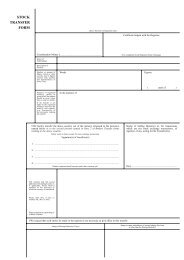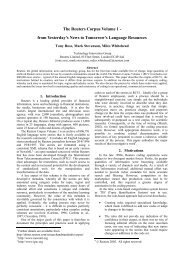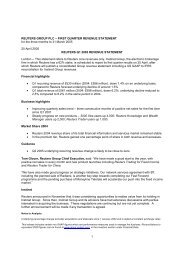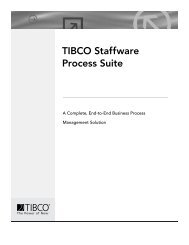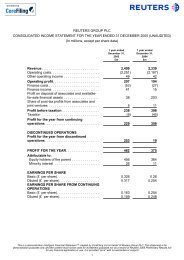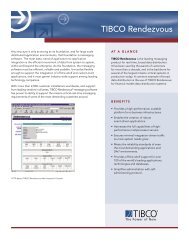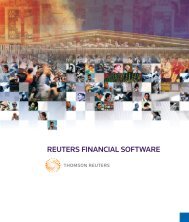Reuters Group PLC Annual Report and Form 20 ... - Thomson Reuters
Reuters Group PLC Annual Report and Form 20 ... - Thomson Reuters
Reuters Group PLC Annual Report and Form 20 ... - Thomson Reuters
- No tags were found...
Create successful ePaper yourself
Turn your PDF publications into a flip-book with our unique Google optimized e-Paper software.
34 <strong>Reuters</strong> <strong>Group</strong> <strong>PLC</strong> <strong>Annual</strong> <strong>Report</strong> <strong>and</strong> <strong>Form</strong> <strong>20</strong>-F <strong>20</strong>02Operating <strong>and</strong> financial reviewcontinuedUS GAAPA reconciliation of net income under UK <strong>and</strong> US GAAP is set out onpage 67. A discussion of the relevant US accounting policies whichdiffer materially from UK GAAP is given on pages 65-66. Details ofrecent US GAAP accounting pronouncements are given on page 70.8. Risk factorsForward-looking statementsThis document contains certain forward-looking statements withinthe meaning of the United States Private Securities Litigation ReformAct of 1995 with respect to the <strong>Group</strong>’s financial condition, resultsof operations <strong>and</strong> business <strong>and</strong> management’s strategy, plans <strong>and</strong>objectives. In particular, all statements that express forecasts,expectations <strong>and</strong> projections with respect to certain matters, includingtrends in results of operations, margins, growth rates, overall financialmarket trends, the impact of interest rates or exchange rates,anticipated cost savings <strong>and</strong> synergies <strong>and</strong> the completion of strategictransactions or restructuring programmes are all forward-lookingstatements. These statements involve risk <strong>and</strong> uncertainty becausethey relate to events <strong>and</strong> depend on circumstances that may occurin the future. There are a number of factors that could cause actualresults <strong>and</strong> developments to differ materially from those expressedor implied by these forward-looking statements. These factors include,but are not limited to, the risk factors discussed below. Anyforward-looking statements made by the <strong>Group</strong> or on its behalf speakonly as of the date they are made. <strong>Reuters</strong> <strong>Group</strong> does not undertaketo update any forward-looking statements.<strong>Reuters</strong> may not be able to realise the anticipated benefits of itsFast Forward transformation planOn 18 February <strong>20</strong>03 <strong>Reuters</strong> announced it was accelerating itsstrategy to become a more focused information company. The FastForward plan includes investing in new information, streamlining theway information is delivered, offering a more simple <strong>and</strong> segmentedproduct line, rationalising the non-core elements of the business <strong>and</strong>reshaping the cost base. While it is expected that these measures willproduce significant competitive advantages, cost savings <strong>and</strong> eventualrevenue growth, there can be no assurance of the extent to whichthese benefits will be realised.Continued or worsened unfavourable conditions in financial marketsmay have a significant adverse effect on the <strong>Group</strong>’s businessThe <strong>Group</strong>’s business is dependent upon the health of the financialmarkets <strong>and</strong> the participants in those markets. The <strong>Group</strong>’s dealingproducts are dependent on the level of activity in the foreign exchangemarket. Similarly, the businesses of BTC <strong>and</strong> Instinet are dependentupon the level of activity in the equity markets. <strong>Reuters</strong> results werenegatively impacted by the continuing economic downturn in <strong>20</strong>02.If these conditions continue or get worse or in the event of significanttrading market disruptions or suspensions there could be furtheradverse effects on the <strong>Group</strong>’s business. In addition, the <strong>Group</strong>’sbusiness could be adversely affected by further consolidations amongclients <strong>and</strong> competitors.Currency fluctuations <strong>and</strong> interest rate fluctuations may have anegative impact on the <strong>Group</strong>’s reported revenue <strong>and</strong> earnings<strong>Reuters</strong> <strong>Group</strong> reports results in UK pounds sterling but receivesrevenue <strong>and</strong> incurs expenses in more than 60 currencies <strong>and</strong> is therebyexposed to the impact of fluctuations in currency rates. Currencymovements had a broadly neutral impact on operating profit in <strong>20</strong>02.A strengthening of sterling from current levels, especially in relationto other currencies in which <strong>Reuters</strong> <strong>Group</strong> derives significant revenuesor holds significant assets such as the euro or the US dollar, couldadversely affect results in future periods. To the extent that thesecurrency exposures are not hedged, exchange rate movements maycause fluctuations in the <strong>Group</strong>’s consolidated financial statements.In addition, an increase in interest rates from current levels couldadversely affect the <strong>Group</strong>’s results in future periods.<strong>Reuters</strong> is exposed to a decline in the valuation of companies inwhich it has invested <strong>and</strong> does not have management control overall of them<strong>Reuters</strong> has entered into joint ventures with, <strong>and</strong> made strategicinvestments in, a number of companies <strong>and</strong> also has significant interestsin companies <strong>and</strong> joint ventures such as Instinet, TSI, Radianz <strong>and</strong> Factiva.The value of a number of these companies fluctuated widely <strong>and</strong>generally decreased significantly from <strong>20</strong>01 through <strong>20</strong>02, in part as aresult of external market factors. The value of <strong>Reuters</strong> interests in thesecompanies is dependent on, among other things, the performance ofthese companies generally, whether such performance meets investors’expectations, <strong>and</strong> external market <strong>and</strong> economic conditions.The <strong>Group</strong> may experience difficulties or delays in developing orresponding to new customer dem<strong>and</strong>s or launching new productsThe <strong>Group</strong>’s business environment is characterised by rapidtechnological change, changing <strong>and</strong> increasingly sophisticatedcustomer dem<strong>and</strong>s <strong>and</strong> evolving industry st<strong>and</strong>ards. If the <strong>Group</strong>is unable to anticipate <strong>and</strong> respond to the dem<strong>and</strong> for new services,products <strong>and</strong> technologies on a timely <strong>and</strong> cost-effective basis <strong>and</strong>to respond <strong>and</strong> adapt to technological advancements <strong>and</strong> changingst<strong>and</strong>ards, its business may be adversely affected. In addition, <strong>Reuters</strong><strong>Group</strong> may fail to launch new products <strong>and</strong> its existing products <strong>and</strong>services may cease to be attractive to customers <strong>and</strong> new products<strong>and</strong> services that the <strong>Group</strong> may develop <strong>and</strong> introduce may notachieve market acceptance.<strong>Reuters</strong> <strong>Group</strong> is dependent on third parties for the provisionof certain network <strong>and</strong> other servicesThe <strong>Group</strong> has outsourced the day-to-day operation of most ofits networks to Radianz, the joint venture with Equant. Radianz willsource the majority of its requirements from Equant <strong>and</strong> will seek toprovide network services to companies in addition to <strong>Reuters</strong> <strong>Group</strong>.<strong>Reuters</strong> <strong>and</strong> Equant are equally represented on the Radianz Board withneither party having control. Accordingly, <strong>Reuters</strong> ability to affect theperformance of Radianz may be limited <strong>and</strong> our business could beadversely affected as a result.In connection with the Bridge acquisition, <strong>Reuters</strong> entered intoa network services agreement with Savvis which was the primaryprovider of network services to Bridge. <strong>Reuters</strong> currently holds Savvispreferred stock that votes as, <strong>and</strong> is convertible into, an approximately15% common stock interest in Savvis share capital, <strong>and</strong> has anobserver on Savvis’ board. <strong>Reuters</strong> has very limited, if any, ability toaffect the performance of Savvis. Should Savvis fail, or be unable toprovide network services necessary to the continued conduct of theBridge businesses <strong>Reuters</strong> acquired before <strong>Reuters</strong> is able to migratethese services to Radianz or make other alternative arrangements, the<strong>Group</strong>’s business would be adversely affected.The <strong>Group</strong>’s business may be adversely affected if our networksor systems experience any significant failures or interruptions orcannot accommodate increased traffic<strong>Reuters</strong> <strong>Group</strong>’s business is dependent on the ability to h<strong>and</strong>lespeedily substantial quantities of data <strong>and</strong> transactions on itscomputer-based networks <strong>and</strong> systems <strong>and</strong> those of Radianz, Savvis<strong>and</strong> others. Any significant failure or interruption of such systems dueto factors beyond the <strong>Group</strong>’s control, including terrorist activities,could have a material adverse effect on its business <strong>and</strong> results ofoperations. The continuing increase in the update rates of marketdata may impact product <strong>and</strong> network performance from time to time.Factors that have significantly increased the market data update ratesinclude: the emergence of Nasdaq’s SuperMontage <strong>and</strong> proprietarydata feeds from other markets; high market volatility; decimalisation;<strong>and</strong> the multiple listing of options. While the <strong>Group</strong> has implementeda number of capacity management initiatives, there can be noassurance that the <strong>Group</strong> <strong>and</strong> its network providers will be able tosuccessfully accommodate accelerated growth of peak traffic volumes.Changes in the regulatory or competitive environment could havean adverse effect on Instinet’s businessNeither the Instinet alternative trading system (ATS) nor the Isl<strong>and</strong> ATSis currently required to register as a US national securities exchange.However, as the Isl<strong>and</strong> <strong>and</strong> Instinet ATSs are integrated over time, theSEC could determine that exchange registration is necessary resultingin substantial additional regulation of Instinet, which could reduce itsoperational flexibility in ways that could have a material adverse effecton its business. The Instinet ATS <strong>and</strong> the Isl<strong>and</strong> ATS are also subject toRegulation ATS, which requires ATSs meeting certain trading volumecriteria to provide quotation data to an SRO <strong>and</strong> to provide otherbroker-dealers execution access to such quotes. Compliance withRegulation ATS could have a significant negative impact on Instinet’strading volumes. In July <strong>20</strong>02, the SEC also took action that resulted



